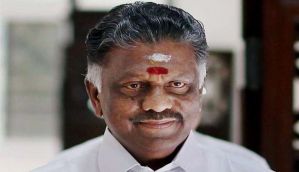Maneka Gandhi lashes out at Javadekar, condemns ministry's 'lust' for killing animals
On 9 June, the Union Minister for Women and Child Development Maneka Gandhi lashed out at Environment Minister Prakash Javadekar, condemning his statements sanctioning the killing of animals in various states.
Along with neelgais, the environment ministry has also sent out notifications to various other states, sanctioning the killing of various animals that pose a nuisance to human life in the vicinity of their natural habitats.
Maneka Gandhi, an acclaimed animal rights activist, condemned the ministry's "lust for killing" animals, saying the ministry has sanctioned the killing of elephants in West Bengal, peacocks in Goa, and monkeys in Himachal Pradesh.
Schedule for Indian Cricket 2016-17 out! Season to see a number of firsts
The Tour Programme and Fixtures Committee of the BCCI met in Mumbai on 9 June to finalise the schedules for International and domestic cricket season of 2016-17. India Cricket's domestic season will kick off in the month of September. For the first time ever, the Duleep Trophy will be played under lights with a pink ball this season.
A total of 918 matches will be organised during the season - including the Ranji trophy, the Vijay Hazare Trophy, the Mushtaq Ali Trophy, the Deodhar Trophy, the Irani Trophy. This translates into 1882 playing days between September 2016 to March 2017. Rajkot, Vizag, Pune, Dharamsala, Ranchi and Indore will host their first-ever test matches in the upcoming season, which will see India play 13 test matches, eight One Day Internationals and three T20 International matches.
The home season will commence with three test matches and five ODIs against New Zealand and five Test Matches, three ODIs and three T20Is against England. Australia will visit India in February-March 2017 to play four Test matches, while Bangladesh is slated to play one test match in India.
Gulberg Society massacre: Quantum of punishment to be declared tomorrow
On 2 June, a special SIT court in Ahmedabad convicted 24 people of the 66 accused and acquitted 36 in the 2002 Gulberg society massacre - which claimed the lives of 69 people, including Congress MP Ehsan Jafri.
The court is likely to pronounce the quantum of punishment for the convicts on 10 June. The prosecution had sought nothing less than death sentence or jail term till death for all the convicts while the defence lawyers contested that the incident was spontaneous and there were enough provocations for it.
On 2 June, Judge PB Desai had convicted 11 persons of offences including murder, while 13 others were charged with lesser offences. The court had acquitted 36 others.
The hearing on quantum of sentence took place on Monday. The quantum of sentence will be pronounced after conclusion of their submissions.
Sushma asks CMs of 6 states to act swiftly in cases of violence against Africans
External affairs minister Sushma Swaraj wrote to the chief ministers of Karnataka, Maharashtra, Delhi, Goa, Uttar Pradesh and Telangana on Wednesday, asking them to act swiftly in cases of violence against Africans.
The letter was sent days before President Pranab Mukherjee travels to Namibia, Ghana and Cote d'Ivoire between 12 and 17 June, and the Prime Minister prepares to travel to Kenya, South Africa and Mozambique next month, while plans are being finalised for high-level political visits to Ethiopia, Algeria, Sudan and Nigeria later this year, according to The Telegraph.
PM Modi thanks Mexico for backing India's NSG bid
On the final leg of his five-nation tour, Prime Minister Narendra Modi arrived in Mexico City on 8 June.
PM Modi issued a joint statement with Mexican President Enrique Peña Nieto. Following delegation-level talks between the leaders, PM Modi thanked Mexico for its positive and constructive support for India's membership in the Nuclear Suppliers Group (NSG).
"Mexico was the first Latin American country to recognise India. I and President Enrique Peña Nieto are meeting for the third time in last two years. Since then the trajectory of our bilateral ties have shown growing intensity," Prime Minister Modi said while issuing a joint statement along with the Mexican President.
While asserting that India and Mexico are now looking to move beyond their buyer-seller relationship, PM Modi said both the nations have agreed to find ways to deepen cooperation in space, and science and technology.
"Information technology, energy, pharmaceuticals, and automotive industries are among key growth areas of our commercial linkages. But, there is potential to expand our commercial and investment, and science and technology partnerships in new areas. In this regard, the President and I agreed to find ways to deepen our cooperation in space, and science and technology," he said.
Manipuri students' protest in Delhi turns violent, several injured
Several Manipuri students were injured in a police lathi charge outside Manipur Bhawan in Delhi on Wednesday as they protested against an all-party delegation that was seeking to hasten the passage of three bills that would affect the state.
The students' efforts, however, seemed to be successful as all three bills have been held back for re-examination.
President Pranab Mukherjee withheld his assent to the Protection of Manipur People Bill, 2015, suggesting the drafting of a fresh bill, according to The Telegraph.
Ancient DNA tells of two origins for dogs
Genetic analyses of a 4,800-year-old Irish dog and 59 other ancient dogs suggest that canines and humans became pals in both Europe and East Asia long before the advent of farming, says a report in sciencenews.org.
Later, dogs from East Asia accompanied their human companions to Europe, where their genetic legacy trumped that of dogs already living there.
Therefore, dogs were domesticated at least twice. That muddled genetic legacy may help explain why previous studies have indicated that dogs were domesticated from wolves only once, although evidence hasn't been clear about whether this took place in East Asia, Central Asia or Europe.
The idea that dogs came from East Asia or Central Asia is mostly based on analysis of DNA from modern dogs, while claims for European origins have been staked on studies of prehistoric pups' genetics.
A 4,800-year-old dog found in a tomb in Newgrange, Ireland, is the first ancient dog to have its entire genetic instruction book, or genome, deciphered. Researchers don't know much about what the midsize dog looked like; it doesn't bear any genetic markers of particular modern dog breeds, Frantz says. "He wasn't black. He wasn't spotted. He wasn't white." Instead, the Newgrange dog was probably a mongrel with fur similar to a wolf's.
Westerners lack education on nuclear disaster risks
Western societies would not respond well to a Fukushima-style nuclear disaster due to a lack of public information, a leading disaster expert has warned. Christopher Abbott told the Guardian he firmly believed that the public ought to be better educated over the hazards and risks they may face. Illustrating his point, he referred to the Fukushima disaster of 2011 in which 160,000 people were evacuated from the vicinity of the plant as experts attempted to tackle the emergency. The evacuation worked, said Abbott, because "the Japanese educate the public". "I just don't see that it would have worked as successfully in western society," he added. "[It's] a very personal opinion but one that is backed up by Japanese colleagues." Abbott, chairman of the Emergency Planning Society CBRN professional working group, made the remarks while giving evidence to a science and technology select committee hearing at the House of Commons on chemical, biological, radiological or nuclear incidents. "We need to better educate the public, because a well-educated public will respond better," he said.







![BJP's Kapil Mishra recreates Shankar Mahadevan’s ‘Breathless’ song to highlight Delhi pollution [WATCH] BJP's Kapil Mishra recreates Shankar Mahadevan’s ‘Breathless’ song to highlight Delhi pollution [WATCH]](https://images.catchnews.com/upload/2022/11/03/kapil-mishra_240884_300x172.png)

![Anupam Kher shares pictures of his toned body on 67th birthday [MUST SEE] Anupam Kher shares pictures of his toned body on 67th birthday [MUST SEE]](https://images.catchnews.com/upload/2022/03/07/Anupam_kher_231145_300x172.jpg)



_in_Assams_Dibrugarh_(Photo_257977_1600x1200.jpg)


